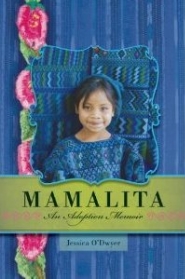I was recently sent this book to read and review, go figure, and yeah it surprised me too that they approached me. I guess they figured that we adoptive mom's can relate...and we can; although we don't always agree of course.
I think I was supposed to pound out this review in a much more timely manner, sorry Ms. O'Dwyer and publicist. Life got in the way. As a mom, much less an adoptive mom, I know you understand that.
However, in the spirit of 'better late than never," here it is:
I got the book in the mail, after promptly forgetting that they were sending it to me:
Mamalita, An Adoption Memoir, by Jessica O'Dwyer.
So, when I opened the mailer, it was a happy surprise; who wouldn't be happy with a new book in the mail? I got the pleasure of anticipating sitting down to read and hopefully savor this book. Here is the jacket description:
"Mamalita is the true story of an ordinary American woman’s quest to adopt a baby girl against almost insurmountable odds in Guatemala."
Now, to be honest, I wasn't sure about this book to start. Obviously, I am an adoptive mom and have adopted here in the states as well as internationally, from Ethiopia. That makes my family a multiracial, multicultural blended up mix of people. It also makes me place adoption and adoption issues pretty high on my personal radar. All this is to say that I had kind of tangentially followed the roller coaster of the adoption world in Guatemala over the years, but from afar (no pun intended), and I was a little hesitant to read this memoir. I feared a skewed perspective or an unfair or romanticized treatment of what was and is still an extremely complicated, layered, and challenging topic. International adoption is not for the faint of heart, nor is it for the unscrupulous. You must have hard eyes to see and hold a steady gaze at the roller coaster of process; making sure along the way that your desires are jiving with foundational ethics, preferably those laid out by the Hague Convention.
So, with that disclaimer and mindset, I began. I found this book honest and compelling. I didn't find it a read that I wanted to shout to all my friends to go pick up, quick. Because I was and still am kind of conflicted about it, the whole seamy side of adoption and the pervasiveness of it in Guatemala. It took me a bit to come to a kind of reading rapport for the author, largely due to my aforementioned guard regarding Guatemalan adoptions. However, as the story continued I found myself appreciating her honesty and the clear eyes she used to see and describe both the beauty and the hardships in Guatemalan adoption.
Many of her feelings and lurches and loops are common ground within the adoption world; they mirror my own and most other mom's passion and desperate need for information, control, and the worry as well as the exhilaration. What I found most compelling was Ms O'Dwyer's choice to move to Guatemala, to stay with her daughter and make sure the process not only proceeded rather than stalled, but to find the cracks in the process, to get the paperwork done through the ever-changing officials, to track down her daughter's birthmom.
Adoption is a system that can lend towards corruption; it only takes a few greedy unscrupulous souls to get involved. This book exposes that seamy side and, as well, exposes how near we all can come to it, even unwittingly, if we but close our eyes with fatigue and temptation. O'Dwyer was willing to dump her facilitator, ask hard questions about her daughter's story, and learn how to finish the job through the shifting channels, willing to live in country and care for her daughter as long as it took. She didn't live completely immersed in the culture, she was part of an oddball subculture of PAP's, potential adoptive parents. I'm not sure how she, as a white female foreigner, could have done anything different. It's not possible to blend in, and O'Dwyer's navigation of these tricky cross cultural waters are some of the most interesting parts of this book. She came to a depth of appreciation for her daughter's country and culture that few adoptive parents actually do; even as she missed her home and life in the States and endured frustration and difficulties as a foreign woman, living alone.
Mamalita is an honest, frank retelling of the Guatemalan adoption process: the good, the bad, the ugly. It is a book that might well engender some controversy in this heated climate of international adoption. If only because of that, it is worth a read. It shows us the near precipice where desire, desperation, and truth stand and take stock of each other. I still think about this book because it reveals the complexities of this difficult process, adoption, and it's not a comfortable thing; nor should it be. O'Dwyer shows us the heart of a mother, in this case, an adoptive mother and how she will literally go the distance and move the map of her home to go get her child.





0 comments:
Post a Comment